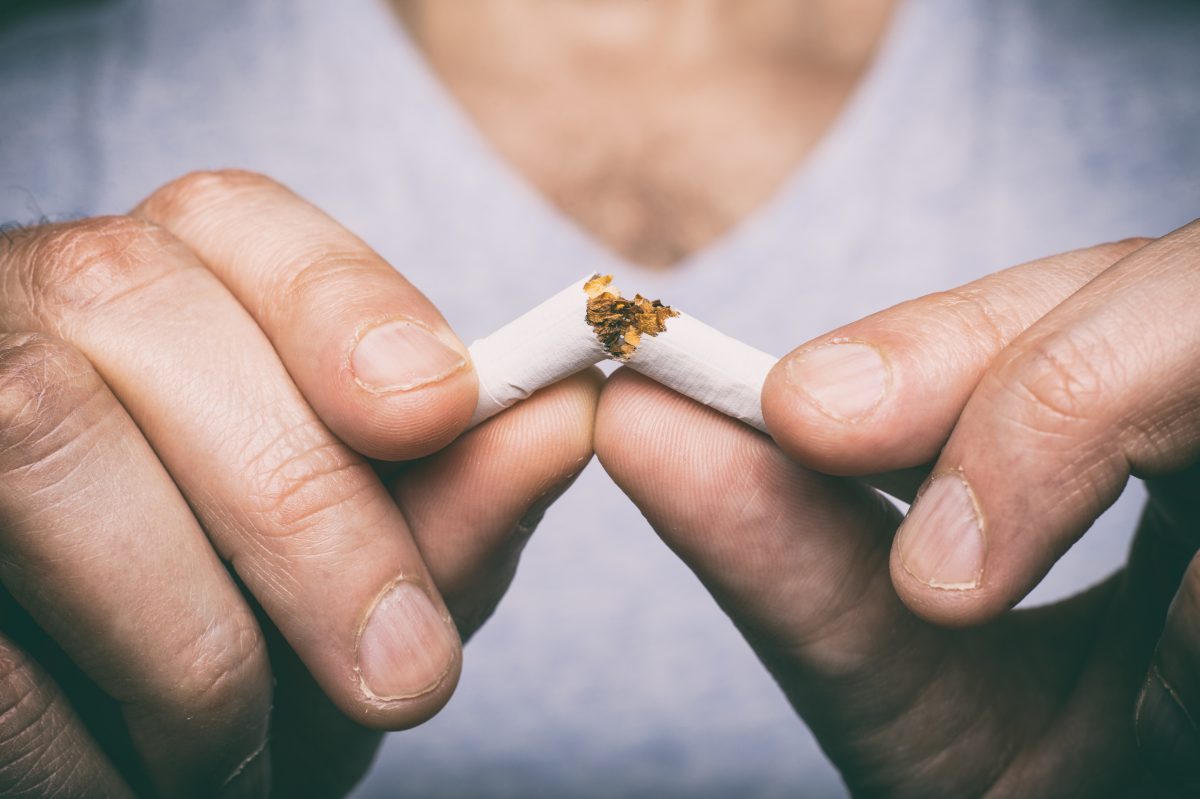If you are a smoker who wants to know how to quit smoking effectively, this article is for you. By now, you may already know the consequences of heavy smoking. Nevertheless, you may find that it is difficult to stop this habit.
Let’s try to understand why people start smoking and the reasons why it becomes a challenge to stop. Each smoker has a different story and motivation why they began the habit of smoking. What’s important is for you to know and understand what got you into it.
By knowing the reason behind the habit, you will have the opportunity to change the way you think and behave. It will influence your smoking habits significantly. It is not only the act of smoking that you have to address. You also need to change your way of thinking towards it.
Related article: How to Quit Smoking?
Why Did People Start Smoking Tobacco?
The vast majority of adult smokers usually start smoking before the age of 18 or during their teenage years. Friends or even for those who have parents who smoke are the main influences for this habit. Some excuses we usually from most teens who start smoking tobacco is that they “just wanted to try,” as a “stress reliever,” or they thought that it was “cool” to smoke.
A more significant number of children in elementary school and the early part of middle school have never tried smoking once. Most will say that they never smoke tobacco and they mean what they’re saying. But, as they get older, they start to meet people who do. They get influenced by their friends and become more open to the habit of smoking tobacco.
The advertisements of the tobacco industry, price breakdowns, and promotions have a significant influence on our society. To show how glamorous and exciting smoking is, they spent billions of dollars every year to create. They make smoking tobacco look cool using market ads. Also, tobacco is present in online platforms like social media, online games, movies, and television. These can influence young ones to engage in smoking tobacco.
Related article: How to Overcome Inhalant Abuse?
How Could it become an Addiction?
Tobacco has become one of the most widely abused substances in the world and has always been a trend to use. It is highly addictive. The question is, how does smoking tobacco become an addiction? It is because of nicotine. Nicotine is the main addictive chemical used in tobacco.
This chemical causes a rush of adrenaline when absorbed in the bloodstream. Nicotine also triggers dopamine, the brain’s “happy” chemical. Dopamine stimulates the area of the brain associated with pleasure. When nicotine enhances the degree of these chemicals, your concentration mood levels also change. That’s why smokers find using tobacco so enjoyable.
When you inhale nicotine from the cigarette smoke, the changes rapidly happen. It rushes immediately to your brain where it produces feelings of satisfaction and lessens stress. That’s why the more you smoke; the more your brain becomes used to nicotine.
How Can Tobacco Affect You?
Every single tobacco product you smoke is harmful. Studies found out that smoking is the most significant cause of preventable deaths. Nicotine and other chemicals used in tobacco products flow into our bodies’ major parts. From there, nicotine quickly spread throughout the body. Our organs, such as the heart, brain, lungs, stomach, mouth and throat, and bones, were the most affected areas when it comes to the effects of nicotine in our bodies. These are the repercussions of nicotine in our body:
Circulation of Blood
As when you smoke, the poisons from the tar in your tobacco spread into your blood. These chemicals poison your body. Your blood becomes thicker, and this increases the formation of clots. The blood pressure and the heart rate of the smoker rise, making your heart work harder than before. It will narrow your arteries, reducing the quantity of oxygen-rich blood that circulates in your organs.
Altogether, these particular changes to your body as you smoke tobacco increases the chances of narrowing your arteries and clots form. It increases your risk of suffering from a heart attack or stroke. Prevention is possible if you stop smoking cigarettes as soon as you can.
Heart
The circulation of blood is affected, and so do your heart. There is an increase in the risks that you may suffer from health problems. It includes coronary heart disease, stroke, heart attack, peripheral vascular disease, and cerebrovascular disease.
Carbon monoxide and nicotine from tobacco products put a strain on the heart. These chemicals make the heart work fast, which leads to the furring of the arteries. The risk of having a heart attack will double. As you smoke, you have twice the risk of dying from heart disease than those who are non-smokers.
Brain
If you smoke, you have a higher chance of suffering from a stroke than those who don’t smoke tobacco. Having the habit of smoking can increase your risk of having a brain aneurysm. It is a bulge in a blood vessel caused by a weakening in the blood vessel wall. It will rupture, or it can burst. It can then lead to a severe condition known as subarachnoid hemorrhage. It is a type of stroke that can cause extensive brain damage and death.
Lungs
Your lungs can be the most affected part as you smoke tobacco. Colds, asthma, wheezing, and coughs are just the beginning. Smoking tobacco can cause fatal illnesses such as pneumonia, emphysema and lung cancer. Up to 84% of deaths because of smoking happen from lung cancer. About 83% of deaths from pulmonary disease is because of smoking tobacco.
Stomach
When you are a smoker, you have an increased chance of having stomach cancers or ulcers. Smoking tobacco will weaken the muscles that control the lower end of your gullet (Oesophagus), and it will allow acid from the stomach to travel in the wrong direction. Developing kidney cancer is a risk factor caused by smoking tobacco, and the more you smoke, the more you are a risk of suffering from this health condition.
Mouth and Throat
Bad breath and stained teeth can be due to smoking tobacco. It is a problem in your appearance because it can affect how people perceive you. It also causes gum disease and damage to the sense of taste. Smoking can cause severe damage in your mouth and throat that will increase the risk of cancer in your gullet, voice box, throat, tongue, and lips.
Bones
Weakening and brittleness of your bones can also be an effect of smoking tobacco. Osteoporosis is more likely to be suffered by women. It means that women must need to be more careful about engaging in the habit of smoking tobacco.
For you to avoid the risks of developing health problems, you should avoid smoking tobacco as early as possible. If you started smoking, you should start thinking about putting an end to the bad habit. Let’s learn more about how to quit smoking effectively.
Why is it so hard to quit tobacco?
Stopping or putting an end to smoking tobacco can cause symptoms of nicotine withdrawal. Both your physical and mental well-being will be challenged during withdrawal. It is because mentally, you are forced to give up on your habit. It calls for a major change in your behaviour. Physically, you will be reacting to the absence of nicotine.
Nicotine withdrawal symptoms may cause any of the following symptoms.
- dizziness,
- depression,
- feeling frustration (impatience or anger),
- anxiety,
- irritability,
- trouble in sleeping and concentrating,
- restless or boredom,
- headaches,
- slower heart rate,
- constipation and gas,
- cough,
- dry mouth,
- sore throat and nasal drip,
- and chest tightness.
Withdrawal symptoms occur to people who have used tobacco regularly for a few weeks or longer if they will suddenly stop or significantly reduce the amount of their usage. Hence, there is no danger in nicotine withdrawal, but the symptoms can be very uncomfortable. The withdrawal symptoms can last up to a few days or several weeks. But you will eventually start to feel better. You have to maintain being tobacco-free so that you can overcome the withdrawal symptoms.
Related article: How to Stop Smoking Marijuana
What Makes Cigarettes Addictive?
Four hundred eighty thousand premature deaths are recorded in North America each year because of tobacco. That is about 1,300 deaths every single day. Cigarettes or tobacco use is the top preventable cause of death and diseases.
Chemicals to your brain
Regular cigarettes or vaping can lead to the release of the chemical dopamine in the human brain, that is because we consume nicotine from both vape and cigarettes. Dopamine and noradrenaline are chemicals that alter the balance of nicotine.
Dopamine, as with many drugs, prompts or teaches the brain to repeat the same behaviour. It makes you use tobacco over and over again. It is also known as reinforcement. Your mood and concentration levels change when nicotine changes the levels of those two chemicals.
But here’s the catch: the brain gets dopamine “hit” from nicotine because the more you smoke, the more your brain becomes immune or used to the nicotine. It is why many smokers enjoy the rush of nicotine and become very dependent on it eventually. All it means is that you have to smoke more to get the same effect.
Nicotine, Dopamine, and Noradrenaline
Nicotine is an alkaloid chemical found in a tobacco plant and an addictive central nervous system stimulant. It causes either ganglionic blockage in high doses or ganglionic stimulation in low doses.
Nicotine releases several neurotransmitters. It includes beta-endorphin, dopamine, acetylcholine, norepinephrine, serotonin and ACTH. It may trigger nausea and vomiting.
Dopamine is a chemical that travels between neurons. Dopamine is one of the brain’s neurotransmitters. When the brain fails to produce enough dopamine, it can result in Parkinson’s disease. Here’s a fact, people with low dopamine may also be more prone to addiction.
Noradrenaline is an organic chemical in the catecholamine family. It functions as a neurotransmitter or hormone. Such chemicals affect the way your brain functions if you are a smoker. Let’s learn more as to what these effects are.
The Brutal Cycle
On each cigarette, a typical smoker takes ten or more puffs. It means a person that smokes about one pack (25 sticks of cigarettes) daily gets at least 250 “hits” every day. That is a lot of teaching the brain to keep using nicotine. Once they started smoking, some people usually have a hard time quitting. It is because of the addictive chemical nicotine. Repeated use of tobacco products increases the risk of addiction.
Whether a person consumes nicotine from smoking tobacco, cigarettes, or vaping, its reinforcing effects might be much more harmful and dangerous than the user imagines. It might also be the reason teens who are trying vape would often switch to cigarettes. It is to get more of the addictive chemical nicotine that the brain now craves.
Physical Effects
When the first-timer starts smoking, they may experience dizziness, headache, nausea, or an upset stomach. But over time, when smoking becomes more and more of a habit, they are building up a tolerance to these effects until they become unnoticeable. When someone is already used to it, it means that they need more nicotine to get the same result that they used to get from fewer cigarettes.
What most don’t know is that the enjoyable effects that they experience from smoking are the body’s reaction to the chemical nicotine. Nicotine can significantly disrupt the body’s natural balance. It is not suitable for the body and our overall well-being.
Every time we light up, nicotine and other chemicals from cigarette and tobacco smoke are absorbed in the body. The chemical nicotine enters the bloodstream and reaches the brain faster than any drugs that enter the body through our veins.
The Body Becoming Dependent on Nicotine
Nicotine works by stimulating our nervous system. It releases specific chemical messengers such as neurotransmitters and hormones. These chemicals affect different parts of our bodies and brain.
When you inhale nicotine, the buzz you feel is the release of epinephrine which stimulates the body and causes your heart rate and blood pressure to increase. It also makes it harder for you to breathe.
The chemicals also activate a specific part of your brain that makes you feel happy by stimulating the release of the hormone dopamine. When dopamine is released, you will feel pleasurable sensations as you are smoking. It can include a feeling of pleasant relaxation and relief of tension.
Nicotine is quickly distributed throughout the brain within 10 seconds when inhaled. The feelings you experience from smoking occur very fast. But after smoking a few times, it begins to decrease your ability to feel pleasure. It causes you to need more of the tobacco to sustain the same feelings.
To continue feeling pleasure from smoking, you must continue to smoke more, more frequently. It will be bad for your health. Therefore, you need to address this bad habit so that you can quit smoking effectively and successfully.
Withdrawal
Cigarette, tobacco, vape or anything that has nicotine withdrawal is different for every smoker. You may feel all sorts of feelings during the time that you are withdrawing from cigarette smoking. Here are some of the most common symptoms of nicotine withdrawal.
- Feeling down and sad
- Feeling grouchy, irritable, or on edge
- Having cravings for a cigarette
- Having trouble sleeping
- Feeling restless
- Feeling more hungry
- Having difficulty concentrating
- Having a slower heart rate
Changing your habits and taking medications can help you manage withdrawal symptoms. Withdrawal can be very uncomfortable, and some people may feel very intense symptoms. It is something that you have to make proper preparations.
Based on studies, there is no health danger from nicotine withdrawal. Withdrawal or quitting smoking is the best thing you can do for your health. Even the very extreme symptoms of withdrawal will eventually lessen and disappear entirely.
Some individuals feel lonelier after they quit smoking as a habit. Take note of this, especially if you have had depression. Take a psychological test to find out if you have signs of depression. If you are depressed or having extreme sadness, let a friend or a family know or visit and try talking to a doctor.
Tobacco, cigarettes or vape use are a global epidemic among teens and young people. As with adults, it poses a grave health threat to young adults and youth in the world. People smoke cigarettes for different reasons. Some think it looks cool. Some do it to fit in. And others start because some of their family members or friends smoke. Whatever your reason may be for starting, you should think about how you can quit smoking as early as possible.
What Are The Effects of Smoking Cigarettes?
Cigarette smoking is the most significant vice causing the increase of death rate in different countries. But we all know the undeniable fact that it is preventable. People don’t care about the ways to prevent it; why? It’s because some of them are acting blind about the effects of cigarette smoking. There are two major factors in our lives: our health and our social life.
Health
Health is a state of physically complete, mental, and social well-being. To achieve a healthy life, a person needs to have a balanced diet and regular exercise. Our social environment is a crucial factor in everyone’s health. Public cleanliness is vital for individual health. Money can buy plenty of cigarette packs, but we can’t buy our health back. Yes, we can go to doctors and specialists, but what if it’s beyond curable? Here are the health effects of cigarette smoking.
Cardiovascular Diseases
Our heart is the most precious organ in our body. We can live without our a quarter of our ribs, the fibula bones in our legs, some of our lymph nodes, tonsils, adenoids, gallbladder, appendix, spleen, a kidney, and even the lungs. But we definitely cannot live without our hearts. In every cigarette, 7,000 chemicals are being breath in, including carbon monoxide, tar, and nicotine.
Nicotine increases your heart rate and blood pressure. When all of these chemicals enter your bloodstream, they make the walls of your arteries sticky. It increases the number of fatty deposits that stick to your artery walls and build up over time. It then makes it harder for oxygen-rich blood to travel through your arteries and reach your heart and brain. If your arteries get clogged up, it can lead to a heart attack or stroke.
Respiratory Diseases
The respiratory system is the second most important thing in our body. How can we breathe if we have an irritated trachea or commonly known as the windpipe and our larynx? If you’re smoking a cigarette, the function of your lungs is suffering in performance.
You will encounter breathlessness because of the swelling and also the narrowing of the lung airways. There is also excess mucus in the lung passages. The poisonous substances build up. It is due to the impairment of your lungs’ clearance system. It can cause lung irritation and damage.
Some common chemicals that cause diseases are carbon monoxide and tar. Carbon monoxide is a very poisonous gas. It is odourless as well as colourless. In large doses, it can quickly cause death. It is because it takes over the oxygen in the blood.
If you smoke, carbon monoxide in your blood makes it more difficult for oxygen to get to your muscles and organs. Tar causes the lungs to die. It is sticky and brown, and stains teeth, fingernails, and lung tissues. When tar enters the lungs, it covers the cilia, and this causes them to stop working and eventually die. It is the reason you may develop conditions like lung cancer.
Cancer
Smoking can cause cancer almost everywhere in our bodies such as bladder cancer, leukemia, cervix, colon, esophagus, kidney, larynx, liver, pancreas, stomach, and bronchus. But the most common one is lung cancer. It is the leading cancer death in North America, among both men and women.
Smoking causes the majority of lung cancers, both smokers and people who suffer exposure to secondhand smoke. If you smoke cigarettes, you are 15 to 30 times more likely to get lung cancer or worse, die from it than those people who do not smoke.
Even if you only smoke a few cigarettes a day, it increases the risk of having lung cancer. The more years you smoke, and the more cigarettes smoked each day, the more likely you’ll develop lung cancer.
Death Rate
In North America, cigarette smoking is responsible for more than 480,000 deaths per year, including the 41,000 who died just from secondhand smoke exposure. Imagine, this is about 1 out of 5 deaths, or about 1,300 deaths every day. On an average basis, non-smokers can live ten years longer than smokers. And also, lung cancer has a higher death rate than breast cancer every year.
One in every five adults smoke cigarettes, that’s over 1 billion people or 20% of the world’s population. Over 800 million of these smokers are men. Not including children in rural areas. Imagine how many people will have cancer or worse, die because of smoking tobacco?
Social Life
In our society, not all people are okay with smokers. In fact, in every country, you can only smoke in designated areas. You can’t smoke anywhere because you’ll have to pay a fine. The social environment is a significant factor in keeping a healthy lifestyle. That’s why some people avoid smoking or smokers, and some don’t.
Plenty of consequences can affect your social life in ways you may not realize. The most significant outcome is secondhand smoke. The people around individuals smoking are inhaling toxins and smoke from cigarettes involuntarily. Secondhand smoke is just as toxic and has proven that it is as deadly as first-hand smoke.
Many people avoid being around smokers because they are afraid of having side effects such as bronchitis or pneumonia, asthma, heart disease, and lung cancer. Quitting would help not only your own but the health of the people around you, or much better, improve your social health.
Quitting smoking can be one of the most challenging yet rewarding things to do. Most smokers said they would like to stop, and many have tried. Some are successful the first time, but others try several times before they finally give up for good.
It might take some time. Quitting will be hard because your body has become addicted to nicotine. But many people have succeeded to quit smoking. Quitting smoking means breaking the term of addiction and substantially reorganize the brain to stop craving nicotine finally.
If you quit smoking, your blood circulation will begin to improve in just 20 minutes. After 12 hours, the carbon monoxide inside your body begins to reduce, and oxygen begins to increase. A few days later, you will notice the improvement of your sense of taste and smell. And within a few weeks, you can feel the difference to be able to breathe freely.
How to Quit Smoking Effectively?
Most people are aware of the risks of cigarette smoking, and yet, the use of tobacco continues to be one of the leading causes of death and diseases. Cigarette smoking is both addiction and habit. The nicotine from the cigarette provides a “good feeling” effect on the brain. As a result, people turn to cigarettes to relieve stress and unwind.
Cigarette smoking can also be a way of coping with boredom, anxiety, or depression. It can also turn into a daily ritual. It becomes an automatic response for people to smoke a cigarette with their morning coffee. People may even smoke while they are on a break at school or work or home at the end of a busy day. For others, smoking became a way to connect with other people.
Knowing the health risks of smoking is not enough for some people to quit the habit. Whether you’re an occasional smoker or a heavy smoker, quitting the practice can be difficult. But it is still possible. To successfully quit smoking, you need to work on your routines and habits, and with this quit plan, any smoker will be confident about stopping it.
Identify what triggers you to smoke
One of the best ways to help you quit cigarette smoking is to identify the things or the situations that make you want to take that cigarette out of the packet and smoke it. Most of the time, when people smoke, it may be because of the situation, the activities, what they are feeling, and the people around them.
If you have encountered a situation that made you angry, it can quickly become a trigger for you to smoke. It is because smoking is one of the ways to calm you down. But remember, there are other effective ways to calm yourself down, try turning to these ways the next time you encounter these situations.
Activities can also trigger you to smoke. An excellent example of these activities that trigger you is drinking alcohol. The next time you go out with your friends to have a drink, try switching non-alcoholic beverages. This way, it will lessen the urge to smoke. Other than that, you could eat snacks. It is a better way of keeping your mouth busy and even forget about smoking.
Another trigger is when you are having unpleasant feelings such as depression, anxiety, or stress. Having these feelings can be a reason to smoke because of the comfort it gives. Though it is essential to keep in mind that there are also very effective ways to comfort these feelings. These ways include relaxation techniques, meditating, or simple exercises.
Prepare a quit plan
There are many ways on how to quit smoking. Once you decide to stop, you can start preparing for your quit date to keep yourself on track. When you are developing your plan, think about the challenges in the early stages of quitting and the late stage. It is in this way that you can prevent yourself from going back to your habits.
There are ways to help you prepare for your quit day. For instance, you can start by throwing all your cigarettes, your lighters, and all your ashtrays away. You can also tell your friends, co-workers about your quit day, let them know of your plan, and be confident about it. You can also sign yourself up for therapy or attend a non-smoking group.
Layout your activities
Your daily activities can help you on your journey to quitting. These activities can also break the connection between the things that trigger you to smoke. In turn, it is the right way of fighting the urge to smoke.
On your quit day, keep yourself busy and productive. This way, you can delay the urge to smoke. Usually, the urge to smoke will only last 2-5 minutes, so, when you are doing something else, you can forget the urge of wanting to smoke.
Also, when the urge to smoke comes, you should drink more water and juice, this way, it will refresh your throat and avoid the taste of nicotine. You should also drink less and if possible, no alcohol at all.
Exercising is another way of helping yourself quit smoking. By working out, the sweat will help remove the nicotine in your body. By having a goal of keeping yourself healthy, your mind will help tell you that you should avoid cigarette smoking.
Going out with a group of people who do not smoke is also the right way. Whenever you crave a cigarette, you should think about what they think of you, will they like it if you smoke when they are around? Will they like the smell of a cigarette. These factors will help your mind to tell you that you should not smoke.
Try using NRTs
Nicotine Replacement Therapy or NRT is also one of the best ways to help you quit smoking. With the use of Nicotine Replacement Therapy, it can help reduce cravings and withdrawal symptoms that you may encounter while attempting to quit smoking for good.
NRTs are designed to help you stop smoking gradually. At the same time, it will supply you with a controlled dose of nicotine/ It will save you from the exposure to other chemicals that are in tobacco.
There are several types of NRT. There are the skin patches, which has proven to be an effective way of drawing out the nicotine in your body. There is chewing gum, that helps divert the attention of your mouth to something else. There are lozenges, used for the throat. There is also the nasal spray and inhalers, which are both prescriptions only.
By following these, when that quit day comes, you will have more knowledge on how to execute your plan surely have a better experience of handling it. The things that are said above will help you overcome the hardship of trying to quit smoking. Living a long, healthy, and happier life is undoubtedly the most precious thing in the world.
Alternative Activities to Smoking
Are you a regular smoker? Smoking affects a lot of people worldwide. However, not all people stay the same way forever. Some manage to quit successfully. About seven out of ten Canadian adults said that they want to quit. Around 1.3 million smokers want to quit yearly. Not all of them will succeed, but what matters is the desire to stop.
If you’re a smoker who wants to quit, you’re probably thinking of ways on how you can abandon the habit. It’s not easy to quit smoking, that’s why some people continue even if they know that it’s bad for health. However, quitting isn’t an impossible task. You need to distract yourself and find other activities that you can do instead of smoking.
Get good food for yourself
If you’ve just quit smoking, you might find yourself looking for a cigarette. Don’t give in. Look for food that you can eat, such as candy or gum. Stock up on food that you can reach for quickly when you get a sudden craving to go smoking again.
You can even fix yourself a healthy snack. Chop up some vegetables and do a quick stir-fry. Vegetables and fruits aren’t merely great alternatives to smoking, but it can help you to quit smoking for good. Carrots sticks are great snacks for you to consider.
Exercise
Be physically fit as you try to give up smoking. Exercise can help you quit the habit because even 30 minutes of exercise can lessen cravings, and it also enables you to stay away from cigarettes.
Listen and dance to music
Show off your moves and dance! Dancing doesn’t have to in a club. You can turn on your speakers at home and dance to your favourite music. Dance until you forget about smoking. It’s also an excellent way to get some exercise for your body.
If you’re the quiet type, you can sit down and listen to music. Listen to music which will inspire you to do better in life and to quit smoking. You can also listen to podcasts about people who have quit smoking successfully.
Slather on lotion
How many years have you smoked? If you’re one of the long-time smokers, quitting won’t be easy. You may even find yourself reaching for cigarettes even when they’re not there anymore. How can you keep your hands busy enough?
You can buy lotion and include it as a part of your routine. It will surely keep your hands busy. You can also purchase cream with essential oils, which are oil from a particular plant. Common types of essential oils include peppermint, lavender, rose, and chamomile. Though usually used in aromatherapy, having these oils in your lotion can help you relax.
Go out with friends and socialize
Don’t isolate yourself because you’ll end up thinking about going back to smoking. Go out and have fun. Enjoy yourself with your friends and do group activities that will help you bond. There are so many other activities that you can do other than smoking. And besides, you’ll have a great time with your friends and the new people you will meet.
Spend time with your family
Take the time to bond with your family. It’s an excellent way to build a better relationship with your family, and it also takes your mind away from smoking. Visit your parents or siblings if you don’t live with them anymore. Talk to them and catch up on how they are doing so far. If you still live with your family, engage in more conversations. Try suggesting if they want to go on a family trip.
Talk with people in support groups
People in support groups are excellent listeners. Talk to them about your experiences, and you can also ask for tips if you’re still struggling. Who knows, you might make friends during sessions. It helps to have someone listen to you and sympathize as you go through a complicated process.
Change your usual hangout places
Do you usually smoke in a specific area? You might pass by a park or vacant lot on your way home to smoke a cigarette or two. If you want to quit smoking, you have to avoid familiar smoking places because it might trigger you to start the habit again.
Find other routes so you can avoid those places. Go somewhere else, like another park or another place where you can stay with your friends. Don’t go to places where you will remember smoking. Go on an adventure and find something new.
Find a new hobby
You probably dedicated time to smoking when you were still a smoker. Now, you might find yourself with free time. Fill this up by learning something new or developing a new hobby.
Maybe you have books on your shelf that you haven’t touched in years. Spend your time reading. It’s a fun way to learn new things. You can also catch up on the latest episode of the season that you are currently watching.
If you love going outdoors, take the opportunity to go on camping trips, hiking, or rock climbing. Show off your adventurous side by trying an extreme sport. Who knows, maybe you’ll discover that you’re a fearless person who loves an adrenaline rush.
Develop a new routine
If smoking is a part of your daily life, removing it can be challenging for you. The key to success is to make a new one. Make a regular schedule, and you can even include new things to do if you have extra time.
Do household chores
If you’re aiming to step away from smoking, it’s better to be productive at the same time, right? Why not do the household chores? Do the usual cleaning around your home. Dust off the furniture, and wipe the smudges off.
Clean out your closet. Categorize and organize your clothes. Gather your dirty clothes and do your laundry. Vacuum the rugs and carpets in your room and the other parts of the house. If you have extra space in your backyard, make a garden. You can also prune the hedges and clear out the weeds. Mow the lawn, and sweep off fallen leaves.
Even though it’s hard to quit smoking, there are tons of activities for you to try as you go through the process. You can eat good food, and do exercises which will help you mentally and physically. All you need to do is be creative enough to try new things, and you’ll end up leaving smoking for good in no time at all.
How to Encourage a Smoker to Quit?
Smoking is a hard habit to kick. Most people try, but some can’t leave it behind. Do you know someone who smokes? You probably do, for there are approximately a billion smokers worldwide. Kiribati has the most significant number of smokers, with 52.2% of its population puffing away on cigarettes and other smoking paraphernalia.
Smoking can even be fatal to some people. It causes approximately 90% of lung cancer deaths and raises the risk of death for all smokers. If you know somebody who’s trying to stop smoking, then that’s a great thing.
However, your friend or family member might have difficulties in doing it. They might need encouragement from people like you. Here are some things that you can discuss with them to help them quit smoking.
Don’t pressure the smoker to speed up the process
Leaving smoking behind isn’t a quick process. After your friend decides to quit, it won’t be as if the desire to smoke will vanish in an instant. That’s why your friend needs strength to finish the process.
There will be times when your friend will be highly tempted to smoke again. Things like social events, stressful situations, and alcohol intoxication can trigger smoking. Support your friend through these triggers and let him know that even when he fails at times, he shouldn’t give up.
When your friend is having a hard time, don’t pressure him. Let him do it at his pace, and help him through the process. Don’t let him feel as if you’re rushing him to finish smoking quickly. Let him know that you want to help, but don’t be too overbearing.
Check up on him or her but don’t nag
It’s common to ask updates about your friend’s progress. After all, you are concerned. However, don’t annoy your friend by asking him too many questions. Don’t always remind him that he needs to do this or that. Don’t scold him too harshly when he fails.
Nagging your friend might annoy him and might lead him to stay away from you. That’s why you have to know your boundaries and respect his space. Help him but also be sensitive to his needs for that moment.
Ask him what he or she needs
The process might be stressful for your friend, and there will be times when he might need help with household chores or cooking. Be a good friend and offer to help him in even the simple things. It will encourage your friend and help him cope with his life and the stress of going through the process of quitting smoking. These gestures might seem minimal, but it helps a lot.
Talk about the health benefits of quitting smoking
Once a person removes tobacco from his life, he’ll see an enormous difference. Maybe the effects aren’t immediately visible, but they will manifest when a person continues to live a smoking-free life.
If your friend wants to go back to smoking, you can remind him of the harmful effects of tobacco. This unhealthy habit increases the risk of coronary heart disease, stroke, and lung cancer. Smokers are also more prone to cardiovascular disease, respiratory disease, and cancer.
Quitting smoking will yield excellent results. It will benefit your friend’s health because it will reduce the risk of cardiovascular diseases, heart attacks, strokes, and various types of cancers. His body will recover from the effects of smoking, given that he gives up the habit for good.
Distract the smoker
Your friend might get tempted to smoke again if all he does is sit around. Why don’t you invite him to hang out? You can go on a picnic together. Ask your friend about his favourite food, and maybe you can bring those to your picnic. You can also eat lunch or dinner together, and let your friend decide where you can get excellent food to eat.
If you have a large group of friends, invite them over for a small gathering. You can play board games or group games which your friends will enjoy. You can also watch a movie together while eating popcorn. You can even trade stories about your experiences if you’ve been friends for a long time.
You can go to the mall, shop, and have fun. You can look at those clothes that you like and maybe buy some of them, too. You can also watch a movie after shopping. You can go to concerts and enjoy yourself. There are a lot of things that you can do with your friend, which can help distract him.
Remind them of their motivation
Your friend will have a reason as to why he wants to quit smoking. Maybe he realized that it’s not a healthy choice, or it’s not a good example to show to his kids. Whatever his reason is, remind him. He will have those times when he’ll want to smoke, but you have to help him resist the temptation.
If you don’t know the reason, you can talk to your friend. However, don’t pry too much. If your friend doesn’t want to open up, don’t force him. Wait until he’s comfortable enough to share things with you. Be sensitive to his moods, and be cautious in approaching him.
Introduce the smoker to alternatives
If your friend wants help, let him know that he can use options like a nicotine patch. It contains nicotine and varies in dosages such as 21mg, 14mg, and 7mg. Your friend might need the most substantial dosage if he’s still in the beginning stages of the process. The dosage will gradually decrease until the smoker can function without the patch.
There’s also nicotine gum, and your friend might need to chew at least nine pieces of gum for the first six weeks. The quantity will gradually decrease, in the same way as the patch. If your friend loves candy, you can get him nicotine lozenges. It comes in 2 mg and 4 mg tablets. The smoker can take a pill every two hours if he’s beginning the process.
Takeaway
Quitting smoking is a complicated process. There will be times when the smoker will want to smoke again or feel like a failure when he fails in the process. If you have a friend who’s quitting, you can help him. Encourage him by being sensitive to his progress, and by helping him in some chores.
You can help him get involved in activities to distract him. Remind him of the benefits of quitting smoking and remind him of his motivation to quit. It’s not impossible to give up smoking as long as smokers get the help that they need from friends, family, and professionals.












